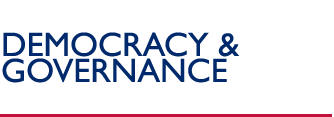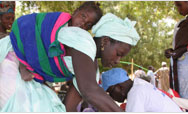Democracy and Governance in Rwanda
The Development Challenge: Even as Rwanda forges its future in the Great Lakes and East Africa regions, the legacy of the 1994 genocide remains, threatening both internal development and regional stability. Rwanda lost large numbers of people during the genocide, which disproportionately targeted educated and moderate Rwandans. Reconciliation and recovery from the 1994 genocide will depend largely on the resolution of pending legal cases. With a staggering backlog of more than 100,000 cases, the traditional justice system has a major challenge, and, to date, progress has been slow. A justice reform law passed in 2004 should enable the process to get fully underway.
Rwandans' precarious living situation was threatened in 2004, when poor rainfall reduced agricultural production. As a result, food prices increased by 28.4%. Exports increased by an estimated 10.3% in 2004, due largely to specialty coffee exports. However, reduced exports of other crops contributed to a significant balance of payments deficit. Fiscal deficits remain high at 5.5% of the gross domestic product. Most current economic growth is due to increased exports and a construction boom. Rwanda realized $22.9 million in debt forgiveness under the Highly Indebted Poor Countries (HIPC) Initiative in 2003. With continued satisfactory macroeconomic performance, it is expected that Rwanda will reach its HIPC Completion Point in February 2005. The World Bank Group recently signed a combined credit and grant package of $65 million to support poverty reduction programs. This reflects increased international confidence in Rwanda's medium-term economic prospects and Government of Rwanda (GOR) economic policies.
Rwanda's political development is mixed. One year after presidential and parliamentary elections and the adoption of a new constitution, there is progress in shifting responsibility for government services to the local level. At the same time, the GOR is downsizing its civil service employment dramatically; 1,500 civil servants were recently terminated. The GOR legitimately prioritizes its internal security concerns and is concerned about a return of violent ethnic divisions. Fueled by this concern, it has retained stringent limits on the freedom of expression of political parties and the media. USAID is actively working to create a more open political dialogue through its democracy and governance programs.
The United States has multiple national interests in Rwanda: increasing regional stability; promoting democracy and human rights; advancing economic prosperity and security; and enhancing global health. Stemming the HIV/AIDS epidemic and alleviating Rwanda's crushing poverty align squarely with U.S. policy goals. More open political discourse within Rwanda and greater regional stability would advance U.S. interests in Rwanda and the region, as well as improve the lives of Rwandans. The USG hopes to consolidate the regional peace process and accelerate Rwanda's political and economic development.
The USAID Program: The goal of USAID's assistance to Rwanda is to increase economic growth and improve the well-being of the population. The program focuses on three strategic objectives: improved governance and reconciliation, increased use of health services including HIV/AIDS care and prevention, and rural economic growth. All three programs use decentralization as a means of promoting change and improving livelihoods.
USAID supports improved governance by increasing citizen participation, strengthening civil society, rebuilding the justice sector, and assisting the GOR with the implementation of decentralization. The health program focuses on building a decentralized health system for family planning, reproductive health (RH), child health, malaria, HIV/AIDS and nutrition; improving access, quality and sustainability of basic health services; and empowering Rwandans to take responsibility for improving their health. USAID's economic growth program expands economic opportunities in rural areas by promoting value-added crops and increasing the diversity of off-farm productive enterprises. It focuses on agricultural productivity and the mobilization of financial resources for agriculture.
(Excerpted from the 2006 Congressional Budget Justification for Rwanda)
Back to Top ^
|


